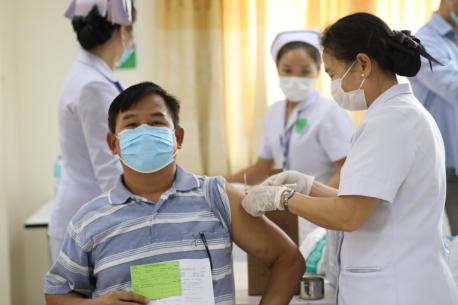
The COVID-19 Vaccine Rollout in Laos, Where Everyone Is Like Family
Nurses who’ve held the coronavirus front line continue to take care of their own, immunizing their nation's elders and those most at risk.
Somsouk Khounmany, a 53-year-old nurse in the Maternal and Child Health (MCH) Department at the Mittaphab Hospital, in Lao's capital, Vientiane, took part in a 2-day immunization drive at the hospital for people who are most likely to develop severe symptoms from COVID-19 infection along with frontline health workers.
Laos received its first shipment of COVID-19 vaccines from the COVAX initiative on March 20, the first of its initial allocation of 480,000 doses. Khounmany has been vaccinated against COVID-19 and is now working hard, alongside her fellow nurses, to give the public the same measure of protection she now enjoys.

Despite her training, Somsouk Khounmany admits that even she, like so many others, was anxious during the early days of the coronavirus pandemic. One of the gratifying things about life one year later is giving her patients the COVID-19 vaccine and seeing them hopeful again. © UNICEF Laos/2021/SSiriphongphanh
All Lao people are like one huge family to me. So I feel very proud to be able to provide them with vaccinations against COVID-19. My work may sometimes be quite exhausting, but I am still motivated to continue ensuring that all Lao people have equitable access to COVID-19 vaccines. — Somsouk Khounmany, nurse, Mittaphab Hospital, Vientiane
"All Lao people are like one huge family to me and so I feel very proud to be able to provide them with vaccinations against COVID-19,” said Khounmany. “My work may sometimes be quite exhausting, but I am still motivated to continue ensuring that all Lao people have equitable access to COVID-19 vaccines.”
You can help UNICEF rush vaccines and critical lifesaving supplies to protect health workers, families and communities in Laos and around the world. Please donate today.
Top photo: A nurse at Mittaphab Hospital's Maternal and Child Health Department, Somsouk Khounmany gives a patient his first dose of the AstraZeneca vaccine during the April 2 – 3 immunization drive held in Laos' capital, Vientiane. © UNICEF Laos/2021/SSiriphongphanh
HOW TO HELP
There are many ways to make a difference
War, famine, poverty, natural disasters — threats to the world's children keep coming. But UNICEF won't stop working to keep children healthy and safe.
UNICEF works in over 190 countries and territories — more places than any other children's organization. UNICEF has the world's largest humanitarian warehouse and, when disaster strikes, can get supplies almost anywhere within 72 hours. Constantly innovating, always advocating for a better world for children, UNICEF works to ensure that every child can grow up healthy, educated, protected and respected.
Would you like to help give all children the opportunity to reach their full potential? There are many ways to get involved.





